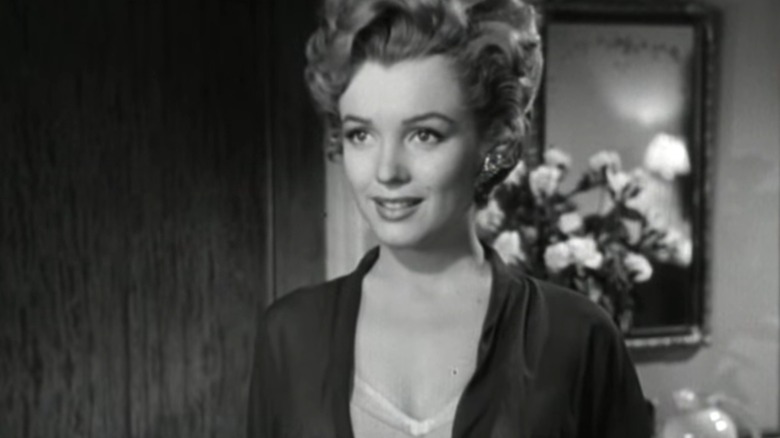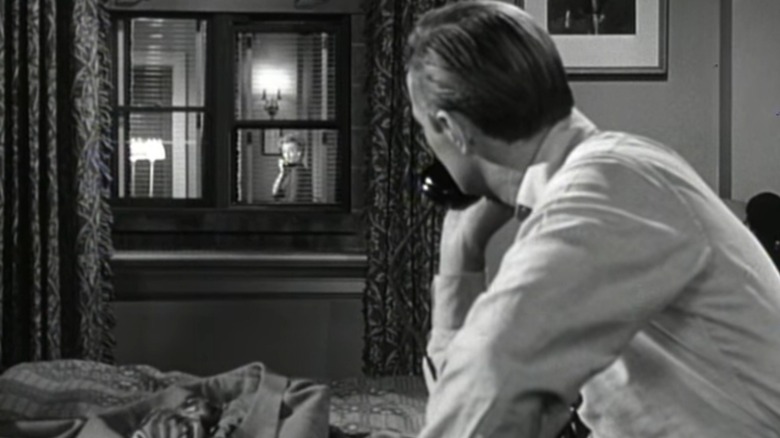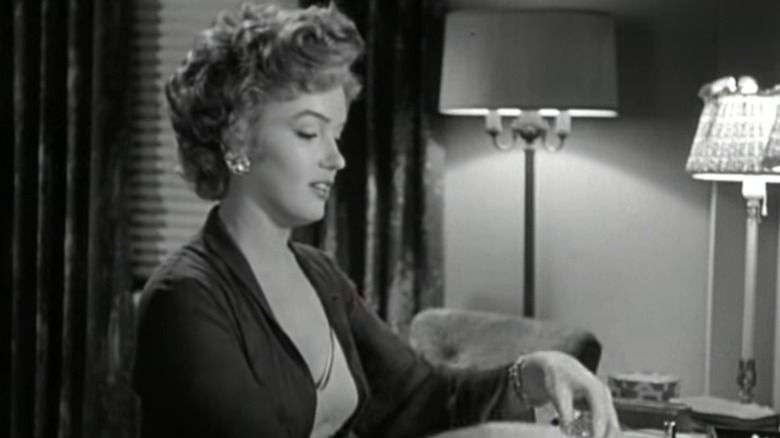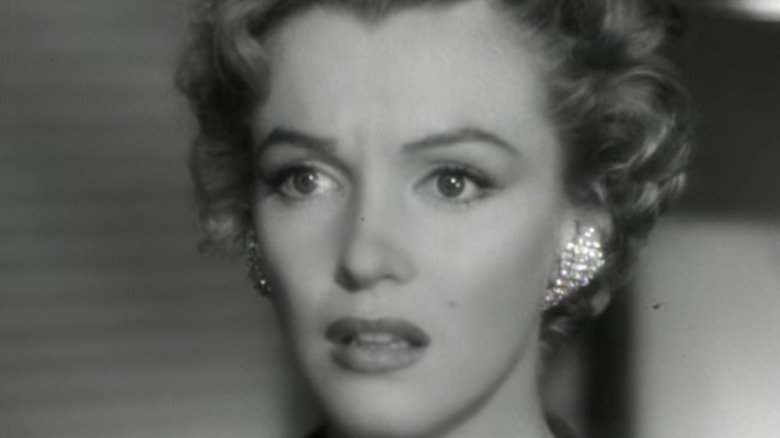The Only Marilyn Monroe Movie That Has A Perfect Rotten Tomatoes Score
Superstar Marilyn Monroe passed away in 1962, but her legacy lives on in the form of several classic movies that still hold up today (plus an endless supply of calendars, posters, and tchotchkes, and the like). The actor and model appeared in plenty of great films across her lifetime, including several that have only grown in public estimation since their release. Among the best: crowd pleasers like "Gentlemen Prefer Blondes," "The Seven Year Itch," and "How To Marry A Millionaire," plus stone-cold classics "Some Like It Hot" and "All About Eve."
Surprisingly, though, Monroe's most popular and obviously beloved movies aren't actually her most acclaimed –- at least according to one major metric. Only one of the films she appeared in during her too-short lifetime has a perfect critical score on review aggregate site Rotten Tomatoes, and it's not any of the titles listed above. Instead, that coveted 100% score goes to "Don't Bother To Knock," a comparatively underseen thriller Monroe starred in alongside Anne Bancroft and Richard Widmark in 1952. As with much of Monroe's life though, the truth behind "Don't Bother To Knock" is a lot more complicated than that headline would have us believe.
As of publication time, "Don't Bother To Knock" holds a seemingly impressive 100% fresh score on Rotten Tomatoes, higher even than Joseph L. Mankiewicz's Best Picture winning drama "All About Eve." The movie stars Monroe as Nell, a mysterious young woman who takes a babysitting job at a New York hotel one night and almost immediately begins acting erratically. Soon, several hotel staff members (and some poor, unwitting kids) end up entangled in the events of a dangerous night that constantly threatens to go off the rails. The film was by all accounts a box office disappointment, but it was an early example of Monroe getting the chance to show her genuine acting chops.
Don't Bother To Knock has a perfect score, but that's not the whole story
For The Film Frenzy, Matt Brunson commended the film's taut effectiveness, writing that "a brisk 76-minute running time is all that's required for this nifty thriller to take the stage, impress the audience, and exit with style." He calls the film one of Monroe's "best and most atypical roles," a sentiment that's echoed by several other reviews. Despite its Rotten Tomatoes categorization, though, "Don't Bother To Knock" isn't actually the actor's most-acclaimed film. The movie has better odds at making the 100% marker on the site than many of her other films thanks to its relatively low number of reviews –- it has only 11 listed, while the most acclaimed Monroe film, "All About Eve," has 113. Other popular Monroe flicks have 70 to 90 reviews apiece.
"Don't Bother To Knock" isn't the Monroe movie with the largest number of positive reviews, and in fact, some of the most scathing responses it earned upon release are notably absent from the website. Many of the reviews listed come from modern looks back at the movie, and are written for relatively small websites or local papers. At the time of its release, though, critics actually had a more ambivalent relationship to the material, one that isn't reflected in the makeup of the Rotten Tomatoes score. Bosley Crowther tore Monroe to pieces in his New York Times take on the film, writing:
"The story is that Marilyn Monroe is being groomed by Twentieth Century-Fox for razzle-dazzle stardom on the assumption, we are told, that she is the hottest number to hit Hollywood in years. There may be some grounds for that assumption, but if they also expect her to act, they're going to have to give her a lot of lessons under an able and patient coach."
Early reviews of the film were shot through with sexism
Other critics were similarly disparaging and much more sexist, as Jenna Glatzer's book "Marilyn Monroe: A Photographic Life" notes. While the New York Daily Mirror tried to compliment Monroe by saying she's "more than a sexy dame" and "has good dramatic promise," The New York Post was unimpressed with her role. "They've thrown Marilyn Monroe into the deep dramatic waters, sink or swim," the review for the outlet said, "and while she doesn't really do either, you might say that she floats. With that figure, what else can she do?" Almost every review excerpt about the film that I was able to find includes commentary on Monroe's body.
Another appraisal of the film, this one cited in "Marilyn Monroe: Her Films, Her Life" by Michelle Vogel, was equally off-putting. Philip K. Scheuer, writing for the Los Angeles Times, apparently lamented that such a hot actor would give an impression (which, we should note, was part of the character) that she was "lackluster and drab." He wrote that it was clear from the film that Monroe had "virtually no acting resources," and that "her voice seems as dead as her spirit." There seems to be a huge gulf between initial reviews of the movie –- which were shot through with chauvinistic observations and the skepticism that could only come from an audience who didn't know just how major Monroe would become –- and more modern retrospectives that admire the rarity of this emotionally taxing role.
Monroe was bothered by the scrutiny the film inspired
Monroe herself cited the film as a turning point in her career, in that the media scrutiny on her started to feel like too much at the time. "I'm beginning to feel like a piece of statuary that people are inspecting with a magnifying glass, looking for imperfections," she told Parade after its release (per Glatzer's book). "I do a picture like 'Don't Bother To Knock' and some people say, 'Leave the dramatics to Bette Davis and Olivia de Havilland. Keep Marilyn Monroe in a tight dress and let her drip sex.' It kind of gets me." Even director Howard Hawkes, who would go on to work with Monroe in "Gentlemen Prefer Blondes," apparently once told predatory producer Darryl F. Zanuck that Monroe was miscast in "Don't Bother To Knock," according to biographer Barbara Leaming.
I wish the perfect Rotten Tomatoes score for "Don't Bother To Knock" told the whole story of the movie. It's lovely to think that Monroe, who found stardom torturous and was viewed simply as a sex object by far too many men, got her flowers for one of her first starring roles, a risky (if dated) portrait of a woman on the verge of a nervous breakdown. Unfortunately, as usual, it seems the review aggregation tool only shows one piece of the picture, and the real truth is more complicated — and in some ways disheartening. All this 100% score really tells us is that "Don't Bother To Knock" has been reappraised positively in recent years, despite the harsh, disturbing scrutiny it received from some critics upon release.
If you want to watch the movie and make up your own mind about what place it deserves in pop culture history, you can rent it on Amazon, YouTube, and Apple TV.



